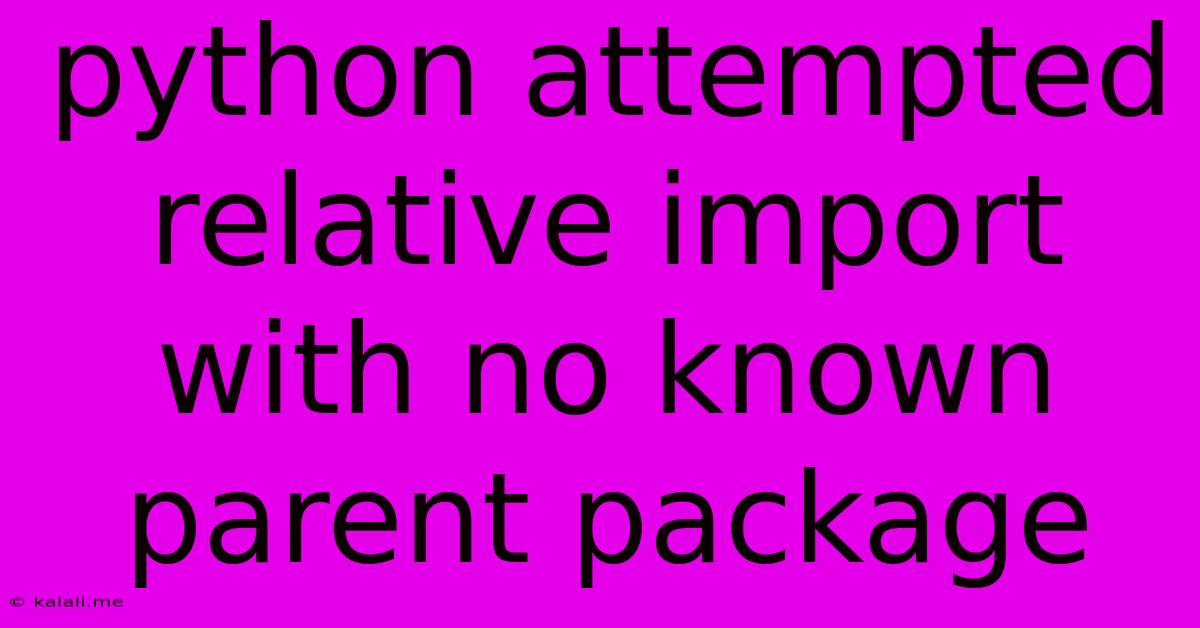Python Attempted Relative Import With No Known Parent Package
Kalali
Jun 09, 2025 · 3 min read

Table of Contents
Python's "Attempted relative import with no known parent package" Error: A Comprehensive Guide
This error, "attempted relative import with no known parent package," is a common frustration for Python developers, especially those working with modules and packages. This article will delve into the root causes of this issue, offer clear explanations, and provide practical solutions to help you overcome this hurdle. Understanding package structure and relative imports is crucial for building well-organized and maintainable Python projects.
The error typically arises when you try to use a relative import (e.g., from .module import function) within a module that isn't part of a package. Relative imports rely on a package structure to determine the correct path to the imported module. Let's explore this in detail.
Understanding Packages and Modules in Python
Before tackling the solution, it's essential to understand the difference between modules and packages in Python.
-
Module: A single Python file (
.py) containing functions, classes, and variables. -
Package: A directory containing one or more modules, plus a special file named
__init__.py. This__init__.pyfile can be empty, but its presence signals to Python that the directory should be treated as a package. Packages allow you to organize your code into a hierarchical structure, making larger projects more manageable.
Why Relative Imports Fail
The "attempted relative import with no known parent package" error occurs because Python cannot find a parent package to resolve the relative import path. This typically happens in one of these scenarios:
-
Running a module directly: If you run a module directly (e.g.,
python my_module.py) without it being part of a package, relative imports will fail. Python's interpreter cannot determine a parent package context for resolving the relative import. -
Incorrect directory structure: Your project's directory structure might not correctly reflect the package hierarchy implied by your relative imports. The imported module might not be located where the relative import expects it to be.
-
Missing
__init__.py: A crucial component is the__init__.pyfile within each package directory. Without it, Python doesn't recognize the directory as a package, leading to this error. Even an empty__init__.pyis sufficient.
Solutions and Best Practices
Here are some practical ways to resolve the "attempted relative import with no known parent package" error:
-
Ensure a proper package structure: Organize your code into a clear package hierarchy. For instance:
mypackage/ ├── __init__.py ├── module1.py └── module2.pyIn
module2.py, you can then use relative imports likefrom .module1 import function. -
Create
__init__.pyfiles: Make sure each directory that you intend to be a package has an__init__.pyfile (even if it's empty). -
Use absolute imports: Instead of relative imports, consider using absolute imports. These specify the full path to the module, eliminating ambiguity. For the example above:
from mypackage.module1 import function -
Run from the package's root: When testing or running your code, make sure you're executing the script from the root directory of your package. This ensures that Python can correctly resolve the paths. You can achieve this using the
-mflag with Python:python -m mypackage.module2 -
Check your PYTHONPATH: While less common, an incorrectly configured
PYTHONPATHenvironment variable can also cause this. Ensure yourPYTHONPATHcorrectly includes the directory containing your packages. -
Refactor your code: If possible, consider refactoring your code to reduce the reliance on relative imports. Absolute imports often lead to cleaner and more readable code.
Choosing Between Relative and Absolute Imports
While both are valid, there are subtle differences:
-
Relative imports: More concise for modules within the same package, but can be confusing in large projects or if the package structure changes.
-
Absolute imports: More explicit and less prone to errors when dealing with complex projects. They are generally preferred for their improved readability and maintainability.
By understanding the underlying principles of Python's module and package system, and implementing the solutions discussed above, you can effectively address the "attempted relative import with no known parent package" error and build robust and well-structured Python applications. Remember, a well-organized codebase is easier to maintain, debug, and extend.
Latest Posts
Latest Posts
-
How To Install A Fluorescent Tube Light Bulb
Jun 09, 2025
-
Failed To Create Error Response From
Jun 09, 2025
-
Is It Necessary To Flush Brake Fluid
Jun 09, 2025
-
Another App Is Currently Holding The Yum Lock
Jun 09, 2025
-
How To Clean Mildew Off Concrete
Jun 09, 2025
Related Post
Thank you for visiting our website which covers about Python Attempted Relative Import With No Known Parent Package . We hope the information provided has been useful to you. Feel free to contact us if you have any questions or need further assistance. See you next time and don't miss to bookmark.